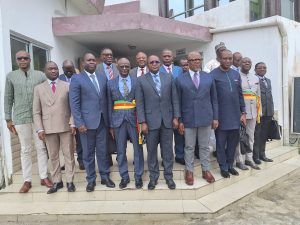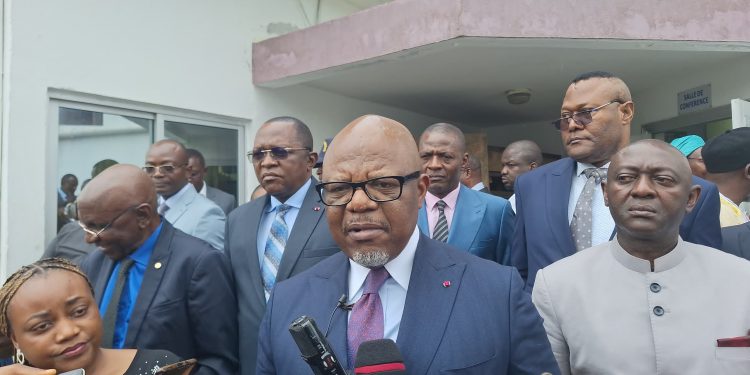Story, Louvier Kindo Tombe
The highpoint of the second Regional Follow-Up Committee meeting of the South West region that took place in Buea on Thursday September 19, 2024 was on the assessment of gains from the Presidential Plan. It was chaired by the Governor of the South West Region, Bernard Okalia Bilai who is also chairperson of the committee. This was in the presence of the Chairperson of the Steering Committee of the PPRD-NW/SW, Minister Paul Tasong.
The meeting came in the wake of recent adjustments in the plan made by the Prime Minister, Head of Government, Chief Dr. Joseph Dion Ngute.
While presenting the major changes, Minister Tasong said, the new perspectives of the PPRD is to align the objectives of the PPRD to the recommendations of the major National Dialogue and National Development Strategy, SND30. This, he said, includes the walk towards the return of Internally Displaced Persons, IDPs and to boost decentralization and local development.
Participants were unanimous that the plan had ushered a new era in boosting the impact of the historic Major National Dialogue which was staged in Yaounde from September 30 to October 4, 2019.
Decentralization and reconstruction
The President of the Steering Committee of the PPRD said with the new dispensation relating to changes in the organic framework, regional and local authorities have been coopted as members of the regional follow-up committee. To further solidify the process, he said, they shall have the pride of place in the effective execution of PPRD projects to boost local development.
Local elected representatives of the South West Region stated their commitment to accompany the government and its partners in the implementing the reorganized Presidential Plan for the Reconstruction and Development of the North West and South West regions.
The meeting was an opportunity for the President of the Steering Committee to unveil the new framework of the plan to stakeholders in the region that will now include more than one implementing partner.
This shift in orientation follows order number 075/CAB/PM of 30 July 2024 signed by the Prime Minister, Head of Government, Chief Dr Joseph Dion Ngute, mandating that local and regional councils play an active role in the implementation of projects under the PPRD.
This will strengthen local involvement, increasing the autonomy of councils and Regional Assemblies in development while receiving support from state stakeholders.
The new phase, Tasong said, will also include Mayors in the Regional follow-up committee. Their presence will ensure project oversight and accountability on the part of all actors.
“The decentralization of the execution of the recovery phase will ensure efficiency and inclusiveness in the selection, maturation, contracting execution, monitoring and evaluation, thus giving more visibility to PPRD-NW/SW projects.”
Addressing stakeholders during the meeting, Minister Paul Tasong said the government initially entrusted the plan to the UNDP because of their expertise in other parts of the world and the reigning climate of insecurity in the two regions.
He expressed satisfaction with the job done by UNDP as an implementing partner in improving the socioeconomic situation of the population.
Fresh call to new partners
Minister Paul Tasong challenged local and regional actors to buckle their belts to ensure the mission of the PPRD-NW/SW is achieved in their communities. He encouraged them on the need to consolidate the achievements made so far by the plan.
While noting the successes of the recovery phase of the plan, he said the reconstruction phase will focus on revamping the agro-industrial sector in the North West and South West regions.
PPDR stakeholders, he added will thus meet with the management of the CDC and PAMOL to discuss how the plan can intervene in improving the activities of the companies.
“…when these industries suffer, the general population suffers,” Tasong said underlining the importance of these companies in the socio-economic recovery of the region.
On his part, the Governor of the South West region who doubles as the President of the Regional Follow-up committee called on all local actors to remain focused and determined to implement the projects to which the state attaches much importance.
He expressed delight that the project has now become more inclusive and visible to ensure the population benefits from the project.
The President of the South West Regional Assembly, Bakoma Zacchaeus Elango also welcomed the inclusion of his institution in the implementation of the reorganised PPRD-NW/SW. The Regional Assembly he said, has already been involved in the implementation of vital projects with the goal to improve the livelihoods of denizens of the region.
In this light, he promised the readiness and availability of his institution to contribute in achieving the goals of the PPRD.
Leveling grounds for IDPs return

At the end of the Major National Dialogue, it was agreed that, in order to fast track the return of IDPs and refugees, major actions were necessary. The setting up of the Emergency Humanitarian Assistance Plan for The North West and South West (EHAP-NW/SW) was attained. This objective was attained through the Ministry of Territorial Administration.
Several humanitarian activities were organized to assuage IDPs. Through this, there has been the distribution of presidential relief supplies to over 3,000 IDPs and 600 ex-refugees in the SW.
Before now, the PPRD had undertaken the issuing of identification cards and Other lost or destroyed documents To IDPs.
It should be noted that, the social-economic inclusion of 90 IDPs in Adamawa, Far North, Centre and West regions have been made a reality.
Other actions taken under the management of return of IDPs and refugees included the financing of 106 youth projects in the North West Region (94, 716 389) FCFA, 61 for SW Region for (94,991 053)FCFA.
Also, was the equipping of 3 Multi-media Centers For the Promotion of youths in the North West, and 1 in the SW Region, (10,000 000) FCFA each.
Other actions under this committee are: the installation of Multi-media Youth Promotion Centers under the Program CMPJ-incubator (7, 583 953) FCFA, Installation of 10 youth Promoters in pioneer villages (8 in The North West Region and two in the South West Region, training of 2052 women from North West in ICT, literacy, project management and the manufacturing of liquid soap, training of 1,480 women and girls From the North West and South West Regions on Income-generating activities, training of 134 refugees (women And women) on sewing, small Business, breeding and agriculture.
There has also been the training of 80 needy women in the North West Region on sewing and manufacturing of antiseptic soap and hand sanitizers.
In addition, they were provided with 40 sewing machines. We have also had the counting and supervision of 5,000 IDPs from the North West and South West regions and training 40 persons in the reception of IDPs, continuous sensitisation of local Communities receiving IDPs by Community Mediators, Urban and Rural Popular Animation Mobile Team and Peace Ambassadors to Promote living together.
We have had declarations requesting public authorities to take further measures to facilitate access to Education to IDPs from conflict Zones, living in other parts of the Country.
Some, 47806 people were sensitized as part of community mobilization for the promotion of peace, living Together and responsible use of Social networks, 31 elderly IDPs benefited from Family placements in Batibo Sub-Division.
The imminent engagement of the reconstruction and development phases the PPRD, officials said, will see destroyed houses reconstructed.








